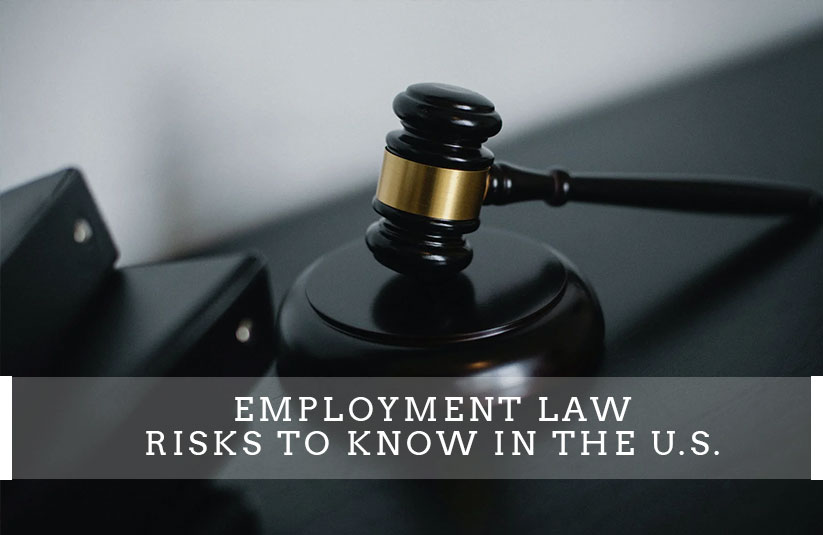The scope of employment law has evolved significantly, especially during the recent Coronavirus pandemic. The pandemic trapped many employers in rapidly changing working circumstances, making it necessary for them to make difficult decisions in various areas, including employment laws. Apart from the everyday challenges of managing employees, the pandemic will likely cause a surge in employment claims affecting businesses that don’t abide by COVID-19 emergency legislation and other facets of employment law.
That said, below are employment law risks that you should know.
1. Failure to Compensate Employees
Ideally, employers should have outlined policies and practices that guide the payment of their employees. However, the effects of the pandemic led to serious financial issues and unexpected liabilities. A key concern for most businesses is the quick shift from in-office working models to teleworking.
Due to this, employers were expected to create proper protocols that ensured that teleworking employees get their rest/meal breaks and proper documentation of hours worked by non-exempt employees. For instance, employers should track time spent by employees answering phone calls or responding to emails after the close of business.
That aside, some states, including California and Illinois, have legislation that requires employers to reimburse their employees for mobile phone charges and other expenses incurred while working from home, such as home internet costs. Additionally, employers who have adopted temperature-taking programs as required by some state laws should compensate employees for time spent as they wait for their temperatures to be taken.
2. Disregarding the Families First Coronavirus Response Act
Congress passed the FFCRA in mid-march, legislation that requires employees to cater for paid sick leaves and family medical leave to employees affected by the pandemic. According to the provisions of FFCRA, an employee should be granted a paid sick leave if they cannot attend work due to the following reasons;
- If they are subject to federal, state, or local isolation and quarantine orders
- If they have been advised to self-isolate due to exposure
- If they are experiencing COVID-related symptoms and seeking a medical diagnosis
- If they are caring for a family member or an individual subject to condition “a” or “b.”
- If they are caring for a child/children whose place of care, school, or childcare provider is not available due to COVID-related issues
Like many other aspects of employment law, it is expected that most employers will face employment lawsuits challenging their failure to observe FFCRA obligations, especially the issue of determining an employee’s eligibility for a paid leave. Besides, even if employers grant paid leaves to employees, they might face suits if they retaliated against those who took or requested paid leaves.
3. OSHA and Workplace Safety Claims
With more states allowing businesses to reopen, state and local authorities have developed protocols that employers should follow, including additional industry-specific guidelines for specific businesses. Apart from state and local guides, the CDC, OSHA, and other health regulatory agencies have distributed materials outlining safety procedures that employers should observe to avoid resurgence.
Unfortunately, most of these protocols change regularly as researchers and the medical community learn more about the virus and how it can be spread. That said, employers will likely face an increase in enforcement actions by the state and local authorities, especially in situations where employers have not updated or completely ignored these provisions.
Similarly, employers will face a workers’ compensation claim if an employee contracts the virus following exposure at work.
4. Lawsuits Due to Improper Layoffs
According to the federal Work Adjustment Retraining Notification Act, employers or businesses with more than 100 employees should give a 60-day notice before closing or laying off employees. This explains why there was an increase in lawsuits targeting employers who violated the WARN act in the first month of the pandemic.
Fortunately, for some businesses, not all layoffs violated this act. For instance, businesses that shut down due to unexpected circumstances are not liable under the WARN act, and businesses that closed due to the pandemic accurately fit this description. Besides, WARN notices are not required for temporary layoffs expected to be less than six months, additionally giving employers a defense claim.
Apart from layoffs, employers also face treatment discrimination and retaliation suits regarding any layoff or separation decisions made due to the pandemic. The laid-off employees may feel discriminated against and selected due to protected characteristics or due to a protected complaint that they made at work.
What Should Employers Do?
Evidently, the pandemic brought forward a complicated situation for most employers. Nonetheless, employers should ensure that they understand the ever-changing employment law trends to mitigate these claims and lawsuits. Employers should work with employment attorneys to make the right workplace policies, such as compliant wage and hourly protocols, detailed layoff process, an extensive return to work guide, and more.
While it is impossible to eliminate the risk of being litigated, complying with these best practices will minimize the claims.













